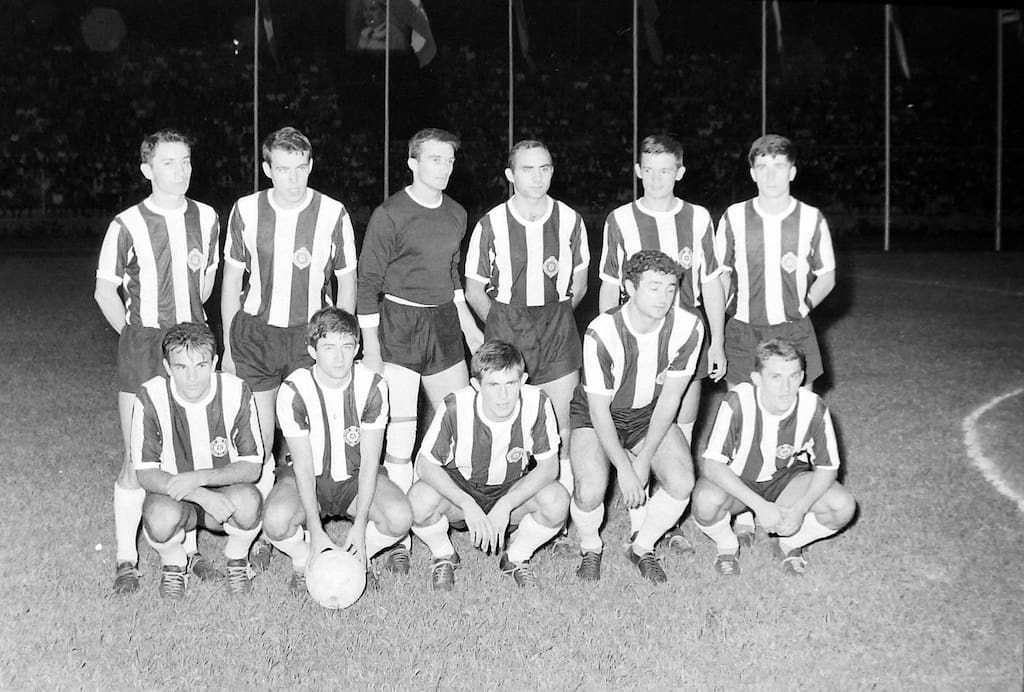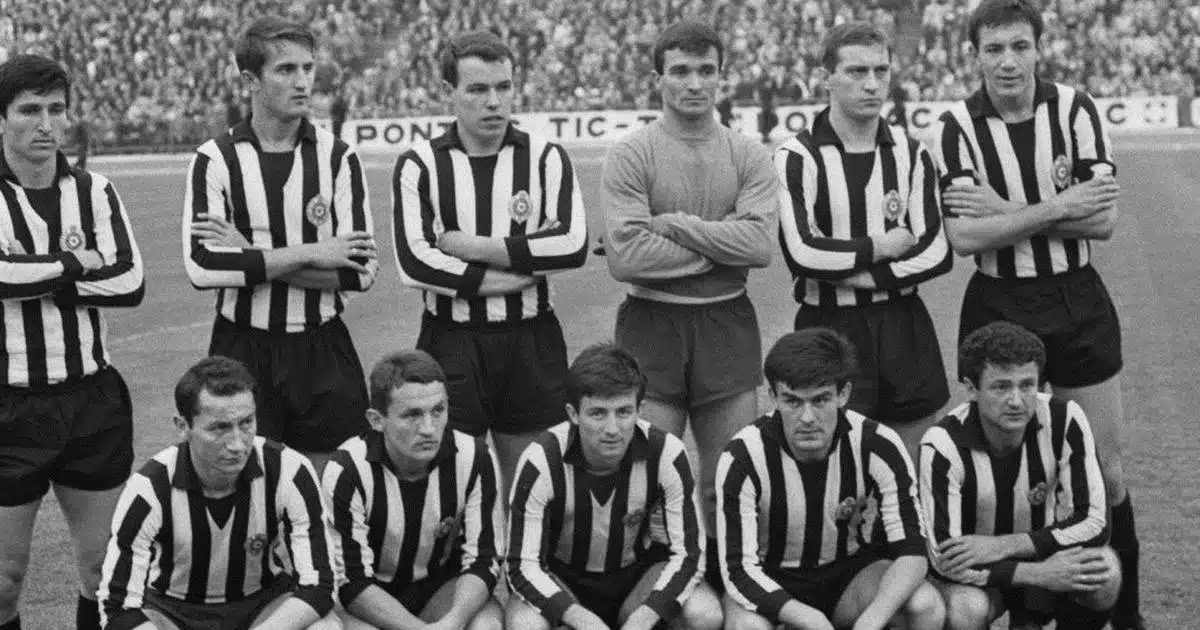May 14, 1945; the Second World War finally comes to an end in the former Yugoslavia after the liberating forces of the Soviet Red Army finally defeated the last remnants of the Wehrmacht and the German war machine that had gripped the European continent since 1938.
Formed in March of that same year, the Yugoslav People’s Army was born and officers from its formations founded the Jugoslovensko sportsko društvo Partizan; Yugoslav Sports Society Partizan or commonly referred to as JSD Partizan, which was an umbrella sports organization consisting of thirty sports clubs for thirty different sports named in honor of Yugoslav partisan forces that resisted Nazi oppression.
One of those clubs was Fudbalski klub Partizan.
Due to the aftermath of the Second World War, and political and national lines being drawn and re-drawn across Europe, Partizan only embarked on regular friendlies both at home and other locations across the continent until the formation of the Yugoslav First League in the latter stages of 1945. By then Partizan had already played friendlies against CSKA Moscow, Slovak Army select, and other clubs in the Czech Republic.
By 1958, the club had adopted its black and white striped kit that it still puts faith in to this day, which ushered in a new era at the club on the back of Partizanove bebe; Partizan’s babies.
Stjepan Bobek.
The all time leading goalscorer in Yugoslavia national team and FK Partizan history. pic.twitter.com/9GtTxrssh0
— Serbian Football (@SerbianFooty) December 5, 2020
At its core, Partizan has kept faith in its own, so it may come as no shock that the first massive push the club made at home and abroad came through a crop of young players that helped truly define the club while sending shockwaves across the continent.

FOOTBALL PARTIZAN TEAM OF FRANCE ; 27 AUGUST 1963 2GJ17WJ FOOTBALL PARTIZAN TEAM OF FRANCE ; 27 AUGUST 1963 (Alamy Stock Photo)
They would again win the league in 1965 and by now had already been dubbed Parni valjak (The Steamroller); a nickname that the club has carried with it since, while also seeing the birth of its bitter rivalry with Crvena zvezda – more commonly known as Red Star Belgrade – come to life after the city rivals won the league in 1964.
But it was during the 1965-66 season where Partizan truly laid down a marker for football in Eastern Europe, with a magical run that ended in an appearance in the final of the European Cup against Spanish juggernaut Real Madrid.
Though Partizan eventually lost 2-1 to Madrid despite holding a 1-0 lead for seventy minutes, the list of scalps that the club collected on their march to near-eternal glory was impressive indeed and included FC Nantes, Werder Bremen (German champions the season prior), Sparta Prague, and a Manchester United side that included George Best and Bobby Charlton.
Despite the loss, Partizan became the first club from the Balkans and Eastern Europe as a whole to reach the final of the European Cup, and to this day, is only one of three clubs from the region to ever reach the final along with rivals Red Star as well as Romanian giants Steaua București.
Partizan would indeed go on to win a major European honor during its history in 1977 in the now-defunct Mitropa Cup, which comprised of clubs that hailed from nations born out of the breaking up of the former Austro-Hungarian Empire. Top sides from Italy, Austria, Czechoslovakia, Yugoslavia, and Hungary, competed against one another in a regional tournament akin to a scaled-down European Cup.
Since then, the club’s influence on the broader landscape of European football has waned regarding its results on the pitch and in club competitions, but it never forgot its roots while it remained one of the two genuine powerhouses in Serbia after Yugoslavia disintegrated in 1992 and was partitioned into what is now seven sovereign nations.
As of the time of writing, Partizan has twenty-seven league titles and 17 domestic cup triumphs. But its biggest contribution has come through its dedication to youth production and development.
From the halls and training pitches of Youth School Belin – Lazarević – Nadoveza, Partizan remains one of the premier pipelines not just in Europe, but across the globe.

Turin, Italy, 15th August 2022. Dusan Vlahovic of Juventus during the Serie A match at Allianz Stadium, Turin. Picture credit should read: Jonathan Moscrop / Sportimage 2JPB7KC Turin, Italy, 15th August 2022. Dusan Vlahovic of Juventus during the Serie A match at Allianz Stadium, Turin. Picture credit should read: Jonathan Moscrop / Sportimage (Alamy Stock Photo)
According to the CIES report from 2019, Partizan was rated as the most productive club in Europe when it came to training professional footballers, boasting seventy-five academy graduates that were plying their trade across thirty-one top divisions in Europe, while the club’s academy setup was rated the best on the continent back in 2015.
Partizan has slipped down to sixth in the last three years as of October 2021, nestled behind AFC Ajax, Shakhtar Donetsk, Sporting CP, Dynamo Kyiv, and Dinamo Zagreb, but their influence across Europe remains given the veritable laundry list of players that have come through its doors to go on to bigger things after receiving a Partizan education.
Headlined by Juventus star Dušan Vlahović, former prominent Partizan youth graduates include Saša Ilić, Savo Milošević, Danko Lazović, Stefan Babović, Miralem Sulejmani, Stevan Jovetić, Adem Ljajić, Matija Nastasić, Lazar Marković, Miloš Jojić, Andrija Živković, Nikola Milenković, Aleksandar Mitrović, and Strahinja Pavlović.
And Partizan has not stopped there, either, with youngsters Nemanja Jović, Marko Milovanović, and Samed Baždar all emerging from the club pipeline recently while Baždar was one of two Serbians featured in The Guardian’s Next Gen list from 2021.
With their place secured in the annals of Serbian football history and holding continued sway across the very top echelon of football in Europe, Fudbalski klub Partizan looks set to remain quietly influential from its seat of power in Autokomanda for years to come.











